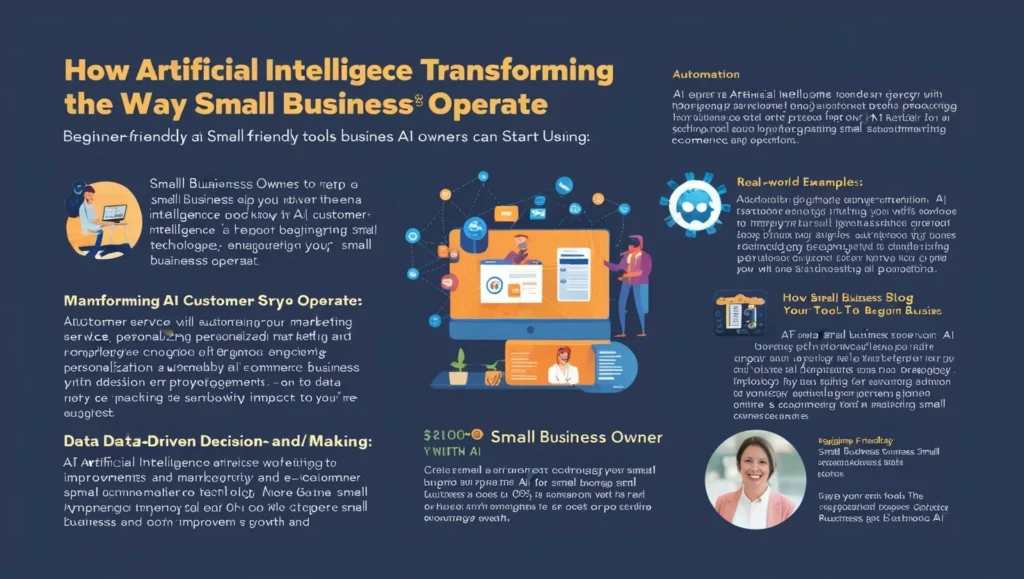AI is Changing the Future of Small Businesses
Embracing Smart Tech to Grow Smarter, Not Harder
Artificial Intelligence (AI) was once the stuff of sci-fi movies and giant tech corporations. But today, AI is no longer a futuristic fantasy or exclusive to billion-dollar companies—it’s right here, helping small businesses work smarter, faster, and more efficiently than ever before.
From automating daily tasks to enhancing customer experiences, AI is redefining how small businesses compete and grow in the digital age. AI is Changing the Future of Small Businesses Let’s dive into how this powerful technology is shaping the future of small businesses—and how you can start leveraging it, too.
🧠 What Is AI, Exactly?
AI (Artificial Intelligence) refers to the ability of machines or software to perform tasks that usually require human intelligence—like learning, reasoning, problem-solving, and decision-making.
This includes:
- Machine learning (learning from data)
- Natural language processing (understanding human language)
- Computer vision (interpreting visual information)
- Automation (handling repetitive tasks)
And the best part? Many AI tools are now affordable, user-friendly, and built for everyday entrepreneurs.
🔑 Key Ways AI is Transforming Small Businesses
1. Automating Repetitive Tasks
Time is one of the most valuable resources for small business owners. AI is Changing the Future of Small Businesses AI helps save it by automating repetitive, time-consuming tasks such as:
- Email responses
- Appointment scheduling
- Invoicing and accounting
- Inventory management
- Customer service chatbots
Example: Tools like Zapier or ChatGPT-based bots can automate workflows, respond to common customer inquiries, and free up your time to focus on strategy and growth.
2. Smarter Marketing with AI Insights
AI can analyze massive amounts of data quickly to identify trends, predict customer behavior, and suggest high-performing content strategies.
How it helps:
- Personalized email campaigns
- Social media content scheduling
- Ad targeting based on user behavior
- SEO optimization and keyword suggestions
Tools to Try:
- Jasper or Copy.ai for content writing
- HubSpot for marketing automation
- Surfer SEO for blog optimization
3. Enhanced Customer Support
AI-driven chatbots and virtual assistants can provide 24/7 customer support without needing a large team. AI is Changing the Future of Small Businesses These bots can answer FAQs, process returns, suggest products, and escalate more complex queries to humans.
Why it matters: Customers expect fast responses. AI lets small businesses deliver top-tier service without the overhead of a big support team.
4. Improved Decision-Making with Data Analytics
AI-powered analytics tools help small business owners make smarter decisions by turning raw data into actionable insights.
Use Cases:
- Identifying best-selling products
- Understanding customer demographics
- Predicting future trends
- Tracking real-time performance metrics
Popular Tools:
- Google Analytics (with AI-based insights)
- Tableau or Power BI for deeper analysis
5. AI in E-commerce
For small e-commerce brands, AI is a game-changer. From personalized product recommendations to dynamic pricing and demand forecasting, AI helps boost sales and enhance the customer journey.
Example:
- Shopify has built-in AI tools that help businesses recommend products, recover abandoned carts, and optimize inventory.
6. Hiring and HR Made Easy
AI can help streamline hiring by analyzing resumes, scheduling interviews, and even assessing candidate fit through behavioral analysis.
Tools to explore:
- HireVue
- BreezyHR
- Zoho Recruit
🌍 Real-World Examples of AI Helping Small Businesses
- Local restaurants use AI-powered POS systems to predict busy hours and optimize staffing.
- Freelancers use AI writing assistants to speed up content creation.
- Boutique e-commerce stores use AI to create tailored shopping experiences for each visitor.
AI isn’t replacing people—it’s helping people do more with less.
⚖️ Challenges to Keep in Mind
While AI offers big advantages, small businesses should be aware of:
- Privacy and data security concerns
- Initial setup or learning curve for some tools
- The importance of maintaining human touch in customer relationships
Start small. Test tools. Keep the balance between tech and humanity.
🛠️ Getting Started: AI Tools for Small Businesses
Here are some beginner-friendly tools to explore:
- ChatGPT – content creation, customer support, idea generation
- Canva (with Magic Studio) – AI-powered design and branding
- Grammarly – content polishing with AI editing
- QuickBooks AI – for accounting and expense management
- Tidio – AI chatbots for customer service
- Mailchimp – email marketing automation with AI suggestions
Final Thoughts
AI is not just for tech giants anymore. It’s here for solo entrepreneurs, local shops, and dreamers with limited budgets but big ambitions. The future of small business isn’t just digital—it’s intelligent.
So don’t fear AI. Embrace it. Use it to free up your time, serve your customers better, and grow with confidence.

